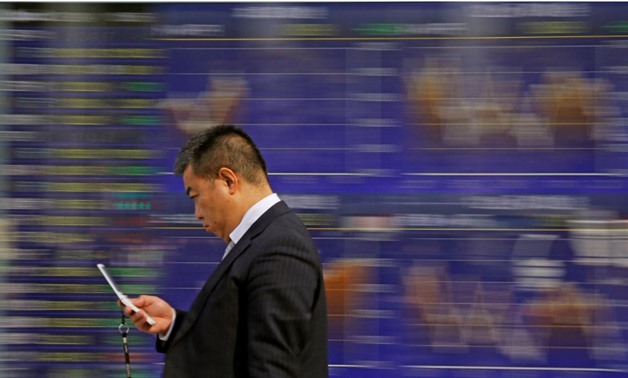
A man walks past an electronic stock quotation board outside a brokerage in Tokyo, Japan, February 9, 2018. REUTERS/Toru Hanai
SHANGHAI - 26 July 2018: Asian shares inched up n Thursday as the United States and Europe agreed to negotiations to ease barriers on trade, but weakness in China markets underscored persistent worries about the outlook for global growth.
European markets looked set to open higher after U.S. President Donald Trump and European Commission President Jean-Claude Juncker had agreed to work to lower industrial tariffs on both sides.
Financial spreadbetters expect Britain’s FTSE to open 0.1 percent higher, Germany’s DAX to climb 0.7 percent and France’s CAC to gain 0.4 percent.
Juncker also called Trump’s agreement to hold off on car tariffs as the two sides launch negotiations to cut other trade barriers a “major concession.”
At the same time, Trump said Europe has agreed to increase purchases of U.S. liquefied natural gas and lower trade barriers to American soybeans.
But a warning of slowing growth from Facebook Inc, which saw the company’s stock fall as much as 24 percent in after-hours trading on Wednesday, highlighted risks for investors and businesses in the current earnings season.
Detroit automakers General Motors Co, Ford Motor Co and Fiat Chrysler Automobiles NV (FCA) also lowered their full-year profit forecasts on Wednesday, in an indication that trade war worries are far from over.
Furthermore, nearly three-quarters of economists polled by Reuters said trade protectionism would have a significant downward impact on global growth next year.
MSCI’s broadest index of Asia-Pacific shares outside Japan rose 0.1 percent.
After months of see-sawing prompted by uncertainty over trade, some markets were enjoying a relief rally, said Matt Simpson, senior market analyst at Faraday Research in Singapore.
“Possibly we’ve got a bit of Trump fatigue,” he said, referring to Trump’s turnabout on trade threats. “You know, nobody cares if it’s going to happen or not at this stage. They just want a slight change of tone.”
He added that ahead of U.S. second-quarter GDP data on Friday and a likely shift in the Bank of Japan’s stimulus policy next week, investors were “in a bit of a holding pattern.”
The BOJ is said to be considering changing the composition of exchange-traded funds it buys as part of its stimulus program. It holds a two-day policy review on July 30-31.
Concerns that the bank could begin unwinding its stimulus pushed the yield on benchmark 10-year Japanese government bonds to its highest level in a year. The yield was 2.5 basis points higher at 0.090 percent.
U.S. Treasury yields also remained elevated, pushed higher by the outcome of the Juncker-Trump meeting. The yield on 10-year notes was at 2.9690 percent, compared with its U.S. close of 2.936 percent on Wednesday.
The two-year yield, which rises with traders’ expectations of higher Fed fund rates, was at 2.6694 percent compared with a U.S. close of 2.657 percent.
ECONOMIC UNCERTAINTIES
In China, the Shanghai Composite index fell 0.7 percent and blue-chip shares lost 1.1 percent. A senior official at the country’s state planner told journalists that “escalating Sino-U.S. trade frictions have brought uncertainties to our country’s economic development.”
The prospect of weaker growth has prompted a loosening of fiscal policy in China as authorities seek to head off a slowdown. Most recently, China’s central bank gave notice to some domestic banks that it would ease a capital requirement to support lending.
Shares in Taiwan gained 0.4 percent and Seoul’s KOSPI added 0.6 percent, with Korean investors taking heart from a respite in trade tensions.
But data on Thursday showed South Korea’s gross domestic product grew at a slower pace in the second quarter, and export growth weakened.
Australian shares were flat and Japan’s Nikkei stock index was down 0.1 percent.
After gains on Wall Street on Wednesday sparked by signs of sunnier days for U.S.-Europe trade, S&P 500 E-mini futures turned lower Thursday in Asia, falling 0.3 percent to 2834.25.
In commodities, the prospect of a deal between the U.S. and Europe lifted the most active soybean futures up 2.2 percent at $8.94-3/4 a bushel, after touching their strongest level since July 9 at $8.95-1/4.
U.S. soybeans are among the goods China included in retaliatory tariffs after Washington slapped additional levies on $34 billion worth of Chinese goods on July 6.
But while the transatlantic mood was improving, “this deal, along with the breakdown of a large M&A deal, leave investors fearing that the trade war has just turned even more so on China,” Citi analysts wrote in a note Thursday, referring to Qualcomm Inc dropping its $44 billion bid for NXP Semiconductors after failing to secure Chinese regulatory approval.
The dollar dropped 0.2 percent against the yen to 110.73
The euro was up less than 0.1 percent on the day at $1.1734, while the dollar index, which tracks the greenback against a basket of six major rivals, fell 0.2 percent to 94.140.
U.S. crude was flat at $69.29 a barrel. Brent crude was 0.5 percent higher at $74.30 per barrel.
After moving slightly higher as the dollar eased, spot gold fell 0.1 percent to $1,229.20 per ounce. [GOL/]


Comments
Leave a Comment